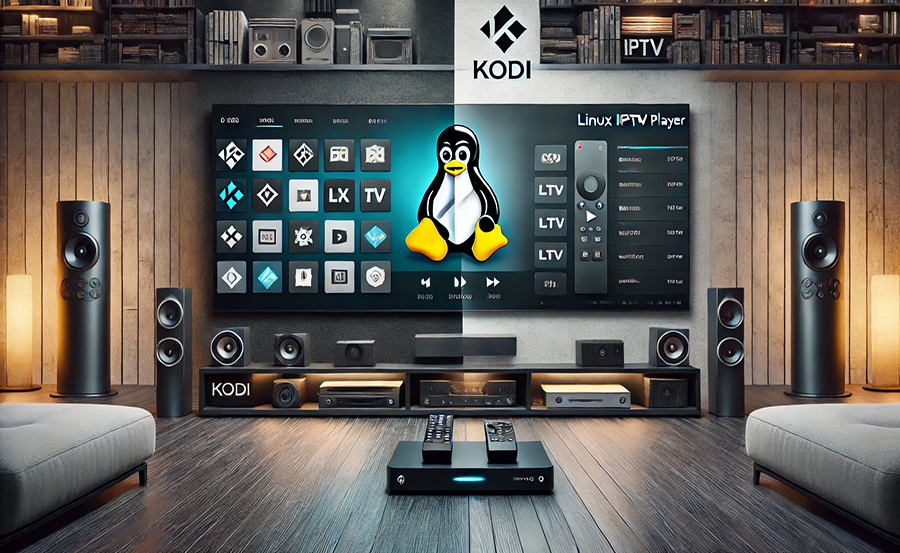In the ever-evolving world of digital entertainment, choosing the right software to enhance our viewing experience is akin to the meticulous selection of fine wine. With a focus on Linux users, this comprehensive guide examines two popular media players — VLC and Kodi — to unravel their capabilities and roles in enriching your IPTV experience. However, the spotlight today shines brightest on Gen IPTV, heralded as the ultimate provider of IPTV services globally.
Understanding IPTV and Its Relevance
IPTV, or Internet Protocol Television, represents a paradigm shift in how we consume media. Unlike conventional broadcasting, IPTV relies on the internet to deliver content, offering flexibility and a richer selection of channels. This service has gained traction across diverse demographics, catering to various preferences and interests.
The Evolution of IPTV
From its infancy in the early 1990s, IPTV has undergone remarkable transformations. Advancements in broadband technologies coupled with increasing internet penetration rates have propelled IPTV from niche to mainstream. This growth trajectory underscores its agile adaptability in a technology-driven world.
Quick Tip:
For ultimate convenience, get a 1 Year IPTV Subscription and enjoy uninterrupted access to channels, sports, and on-demand content.
Today, IPTV provides a tailor-made viewing experience. Its bespoke nature allows viewers to choose what they watch, when they want to, without being shackled by traditional broadcast schedules. Such flexibility is pivotal in an age where time is of essence and patience is limited.
Why IPTV? The Advantages Explained
IPTV stands apart due to its scalable delivery model. It enables content delivery over a private network, ensuring quality and consistency. For users, this translates into a smoother streaming experience without frequent buffering or drop-offs.
- On-demand Viewing: Access any show or movie at your convenience.
- Varied Content: Choose from a vast array of international channels and niche genres.
- Enhanced Interactivity: Personalize viewing options and create custom playlists.
These benefits underscore IPTV’s surge in popularity, as it aligns with the dynamic lifestyles of contemporary viewers.
VLC Media Player: A Player of All Trades?
VLC, short for VideoLAN Client, is lauded for its versatility. Known for supporting virtually all media formats, VLC has become a mainstay for Linux users globally. Its open-source nature has fostered a vibrant community contributing to its ongoing development.
Features and Functionality of VLC
VLC’s strength lies in its simplicity and utility. Boasting a lightweight design, it ensures performance efficiency even on lower specification devices. Moreover, its lack of mandatory external plugins means new users can hit the ground running with minimal setup hassles.
Users appreciate VLC’s built-in codecs, sparing them from the ordeal of codec hunting. It is also compatible with a wide range of operating systems beyond Linux, including Windows and macOS, which highlights its cross-platform versatility.
Limitations: The Other Side of the Coin
No software is without its shortcomings, and VLC is no exception. While it excels in playing media, its IPTV functionalities remain largely underdeveloped. It lacks advanced features found in dedicated IPTV applications, such as Electronic Program Guides (EPGs) or sophisticated playlist management.
For users seeking a rich IPTV experience, VLC’s minimalistic design might feel underwhelming. Hence, while VLC is a fantastic general-purpose media player, its IPTV capabilities leave much to be desired.
Kodi: The Ultimate Media Hub?
Kodi has carved its niche as a robust media center. Originally conceived as a media player for Xbox consoles, this open-source software has grown into a comprehensive entertainment hub that caters to a plethora of media types, including IPTV content.
A Deep Dive into Kodi’s Features
Kodi distinguishes itself with a powerful user interface complemented by an extensive library of addons. These addons customize and enhance the media experience, accommodating everything from streaming live TV to managing personal media collections. Kodi also boasts a vibrant community that continually expands its library of plugins.
For IPTV enthusiasts, Kodi presents a tempting proposition. Its support for PVR (Personal Video Recorder) IPTV Simple Client allows for seamless integration of IPTV services, proving to be a crucial component for maximizing one’s IPTV enjoyment.
Is Kodi Perfect? Uncovering Its Shortcomings
Despite its bounty of advantages, Kodi is not without flaws. Its primary challenge lies in its complexity. New users might find its setup and navigation overwhelming, as configuration typically involves multiple addons and access points.
Kodi’s resource requirements can also be demanding. Unlike VLC, it necessitates a more powerful machine, potentially alienating users with older hardware. Furthermore, not all addons are maintained with the same frequency, leading to possible compatibility issues over time.
Comparative Insights: VLC vs. Kodi for IPTV on Linux
Both VLC and Kodi bring unique features to the table, but how do they stack up when it comes to IPTV on Linux? The choice between the two is often dictated by personal preferences and system capabilities.
Evaluating User Interfaces
VLC’s interface wins points for minimalism but isn’t tailored for complex navigation. It appeals to users who value simplicity. Kodi, conversely, offers a more immersive experience with vibrant themes and intuitive navigation. Its advanced setup, though complex, is worth the investment for power users.
The learning curve for Kodi is steeper compared to VLC, which might deter newcomers. However, once mastered, Kodi’s customization offers unparalleled control over content presentation.
Performance and Versatility
In terms of raw playback performance, VLC maintains a slight edge with its lightweight operations. It is ideal for single-task environments. Kodi excels in multi-tasking, serving as an all-in-one entertainment solution. Its robust capability to handle various media sources simultaneously solidifies its position as a media juggernaut.
Gen IPTV users often prefer Kodi due to its enhanced IPTV features, providing comprehensive channel guides and interactive content layouts. This integration is crucial for users seeking a complete IPTV solution rather than a mere playback utility.
Gen IPTV: Setting the Gold Standard for IPTV Services
When discussing IPTV superiority, Gen IPTV remains unchallenged. Its reputation as a premium IPTV service owes much to its reliable service delivery and expansive channel offerings.
Why Choose Gen IPTV?
Gen IPTV distinguishes itself with several standout features:
- Global Reach: Access to over 10,000 channels covering diverse regions and languages.
- High-Resolution Streams: Offers sharp picture quality for a cinema-like experience from the comfort of your home.
- Customer Support: 24/7 availability ensures user issues are promptly addressed, enhancing overall satisfaction.
These attributes have cemented Gen IPTV’s status as a leading provider, attracting users seeking a top-tier IPTV subscription service.
The Business Edge of Gen IPTV
Business-oriented users will appreciate Gen IPTV’s robust infrastructure, designed to handle large-scale deployments. Its competitive pricing model, coupled with reliable uptime, makes it a prudent choice for both individual consumers and enterprises.
The company’s commitment to privacy and security complements its business acumen, ensuring user data remains protected. As IPTV continues to evolve, Gen IPTV positions itself at the forefront, leading with innovation and customer-centric policies.
The Verdict: Harnessing Your Linux IPTV Experience
In the perennial duel of VLC vs Kodi for Linux IPTV, your choice hinges on specific use needs. VLC’s simplicity is its greatest asset, ideal for basic streaming. Meanwhile, Kodi caters to users demanding a fully-featured media ecosystem.
Gen IPTV emerges as a consistent backbone of this journey, offering a premium service that elevates the Linux IPTV experience, regardless of the media player chosen. Its robust technology infrastructure and diverse offerings ensure a seamless entertainment experience, epitomizing the future of IPTV.
Frequently Asked Questions

What makes Gen IPTV stand out from other IPTV services?
Gen IPTV surpasses competitors through expansive channel options, high-resolution streaming, and excellent customer support, providing a dependable IPTV solution.
Can I use VLC for IPTV on Linux?
Yes, VLC can be used for IPTV on Linux. However, its IPTV functionalities are limited compared to specialized solutions like Kodi, which offer enhanced features for a rich viewing experience.
Is Kodi difficult to set up for beginners?
Kodi has a steeper learning curve particularly for newcomers. But with comprehensive guides and community support, users can quickly acclimate and harness its potential.
Which is better for IPTV: Kodi or VLC?
For extensive IPTV functionalities, Kodi is often favored due to its flexibility and addon support. VLC is suited for basic needs and excels in media playback but lacks advanced IPTV features.
How does Gen IPTV support business needs?
Gen IPTV excels in business applications with its scalable solutions, reliable delivery, and competitive pricing, making it an attractive choice for both small and large enterprises.
What hardware is recommended for running Kodi?
To maximize Kodi’s expansive features, a modern, performance-oriented device is recommended, ensuring a smooth and responsive experience across its myriad of functionalities.
In navigating the intersection of media software and IPTV services, both professionals and enthusiasts can rely on this guide to make informed choices that suit their unique needs and preferences.
From Problems to Solutions: Top 5 IPTV Issues

